Reviews
Anthony Mann
USA, 1947
Credits
Review by Cullen Gallagher
Posted on 04 February 2013
Source Kino International DVD
Categories Noir Mann
Noir films frequently exhibits a tourist-like attraction—a highly romantic sense of sex, danger, and excitement that exhilarates the viewer. Consider these iconic examples: The Maltese Falcon finds Bogart hob-knobbing with comically high-class low-lives like the jovially evil Sydney Greenstreet, the wily Peter Lorre, and the sultry Mary Astor; The Big Sleep once again finds Bogart getting down not only with femme near-fatale Lauren Bacall but also a sexy librarian with come-hither spectacles; and in They Live By Night, Farley Granger and Cathy O’Donnell manage to sustain the purity of their boy-meets-girl innocence.
Not so with any of Anthony Mann’s noirs.
One of the most distinctive characteristics of Anthony Mann’s noir universe is this: you would not want to live there, and you would most certainly not like to die there. He presents crime without passion, killing without romance, and violence without glamour.
Railroaded is a perfect example of Mann’s dire, joyless, and sadistic cinematic cosmos. It’s a variation on the “wrong man” plot in which someone innocent is wrongly accused of a crime they didn’t commit. In this film, however, the tension is compounded by double persecution from both the police and the criminals. Steve Ryan has been framed for the robbery of a beauty parlor bookie joint during which a police officer was killed. When he is unable to prove that he was alone in his garage working during the holdup, the police take him in and attempt to railroad him into a confession. Unable to do so, the police begin digging into her personal life, willing to stop at nothing to secure a conviction that guarantees the death penalty. Meanwhile, the real criminals are just as determined to sit him in that electric chair, and when they learn that Ryan’s sister is out to prove him innocent, they set their sights on her to ensure that her mission fails.
In Railroaded, as in He Walked By Night, Mann strips noir’s generic conventions bare, leaving only the starkest elements remaining. The criminals are reduced to pure greed. The masterminds are Clara Calhoun, the owner of the bookie joint, and Duke Martin, right-hand man to the mob boss who backs the gambling operation. Though Clara and Duke are lovers, not for one moment do they ever act in love—“Duke, don’t you trust me?” Clara asks as she kissed Duke with her lips while trying to steal the loot with her hands, “I like you, if that’s what you mean,” replies Duke as he receives her kisses and maneuvers the money further from her grasp. If the criminals are undressed of their human qualities, so, too, are the police. “Feelings don’t count in my racket, just evidence,” explains head investigator Mickey Ferguson. The police are not motivated by justice but revenge for their fallen partner. The chief of police reminds Ferguson that “only the gas chamber will satisfy me.” So, they terrorize Ryan’s family, ripping the front yard apart and throwing the inside of their house into shambles, looking for any piece of evidence to convict him—not that which would set him free. And let us not forget that the police and the criminals share a common goal: to see Steve Ryan fry in the electric chair.
Only Ryan’s sister, Rosie, acts with any purity of thought. Her conviction, however, is naïve, and at odds with the widespread nastiness around her. In light of the deviousness and cunning of both the police and the criminals, her innocence seems downright foolish. Rosie’s costume, however, might suggest otherwise. When she is at home, Rosie wears not white - the color of angels - but black. When she confronts Clara Calhoun at her hideout, it is Clara who is in white and Rosie in black. At other points throughout the movie, Rosie can be seen wearing clothing that is split down the middle—half-white, half-black, as though there might be a devious side to her nature. If anything, her costuming proves how easy it is for the girl-next-door to slip unnoticed into the underworld, a “black angel” in the tradition of Cornell Woolrich, who wrote of so many devoted women who ventured into the dark night in their quest for revenge.
Mann’s overarching character strategy for Railroaded is to make the audience skeptical of the heroes, and scared of the villains. For the first half of the movie, at least, Mickey Ferguson is as oppressing, dishonest, and terrorizing as Duke Martin. In the second half, when he has a turn of heart and begins believing that Steve Ryan is innocent, Mann still remains suspicious of Ferguson. He’s a distant hero, one who never reveals his heart, soul, or mind. Regardless of what side he is on, we have seen the mechanics of her personality—the deception and destruction that he is capable of. Rosie, too, is a somewhat distant character. Mann never gets too close to her, never reveals too much of her personality. We admire her familial devotion, but as her black-and-white split costuming suggests, perhaps there is a darker side to her, as well. And Duke Martin? In the opening scene we see him blast an innocent woman’s face off with two barrels of a shotgun. Surely that’s one of the most explicit expressions of violence in 1940s noir. Do we need any more reason to be scared of him?
Visually, Mann expresses his worldview most explicitly in the opening holdup and in the climactic gunfight between the criminals and the police. They are unrelentingly brutal. The former features a woman’s face being blown-off by a shotgun at point blank range, while the latter ends with a criminal’s dying grimace caught in an uncomfortably intimate close-up. What these scenes share in common is an overwhelming darkness. The screen is almost entirely black, save for a few snatches of light, barely enough to illuminate even a hint of the human body. Dialog is kept to a minimum, action and movement to a maximum. Like Vincent Minnelli, Anthony Mann stages the actors’ movement like a ballet; unlike Minnelli, however, Mann is a thuggish choreographer, his characters lack heart and soul, and their only action is violence. Mann’s dances are enacted in a spatial and moral void—pure, nihilistic blackness. Not even enough light for shadows. The only major light sources come from the guns themselves, and the explosive discharge that brightens the world for a fleeting instant before disintegrating back into the darkness. Mann’s characters live only in and for those brief moments of violence—in between are the dull, tedious eons of planning and plotting, of interminable waiting. The police and the criminals - and even Rosie, the devoted sister - are restless souls. To them, there is no satisfaction in complacency, no trust in destiny, no belief that everything will turn out all right. That is why the police act like thugs in order to find the evidence they want, and why the criminals take extra measures to ensure the fabric of their fiction stays in tact, and why Rosie enters the underworld whose current sucked in her brother. Mann’s noir has no faith in fate; it believes only in action and violence.
Railroaded is less escapist entertainment than it is a fable of entrapment. Nothing this paranoid, this mistrustful of either sides of the law, can be labeled “escapist.” It traps the viewer but never offers release. It exercises our deepest fears about bad things happening to good people, gives merit to our suspicions about ordinary acquaintances, and shows us how the mechanics of police work are as duplicitous and scheming as the criminal kind. Keeping one’s nose clean is no longer as easy as staying home; even without venturing out into the night, one can be implicated in crimes that can send you to the electric chair. Even a happy ending offers only temporary relief. We’ve seen how lack of evidence proving our innocence is just as damning as evidence proving our guilt. We’ve seen images of a shotgun blowing up in a woman’s face, of police tearing through a family’s home. Even the title of the film, Railroaded, suggests that the more significant crime is that of the police, who believe not that a man is innocent until proven guilty, but that innocence is not a natural state of being, and that guilt is to be presumed unless disproved. Visually, Mann always insists on darkness, thick black levels with no relief, no white to ease our eyes, no purity to ease our spirits, no goodness to soothe our soul, nothing to make us feel safe and sound.
Even though the bad guys get it in the end, the 74 minutes of trauma that Railroaded offers is not so easily shaken off and forgotten. Mann’s noir locates a primal fear of the dark—not one that hides beneath the bed or in your closet, but one that can easily overtake our everyday world. He shows that the natural order of things is against us, and that we can all be “railroaded” at any given moment.
More Noir Mann
-
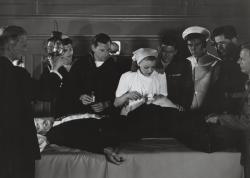
Strangers in the Night
1944 -
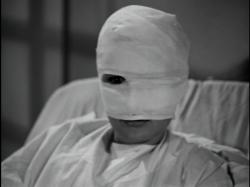
Strange Impersonation
1946 -
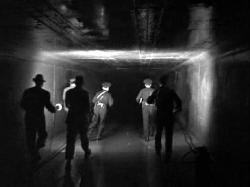
He Walked By Night
1948 -
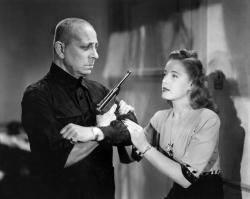
The Great Flamarion
1945 -
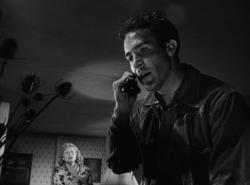
Border Incident
1949 -
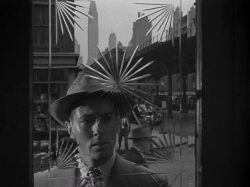
Side Street
1950 -
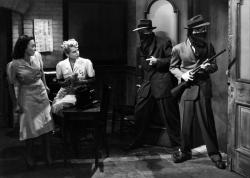
Railroaded
1947
We don’t do comments anymore, but you may contact us here or find us on Twitter or Facebook.



